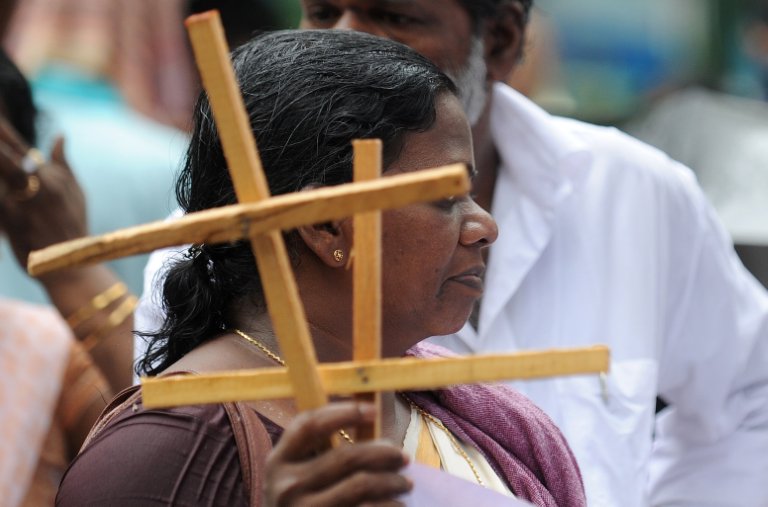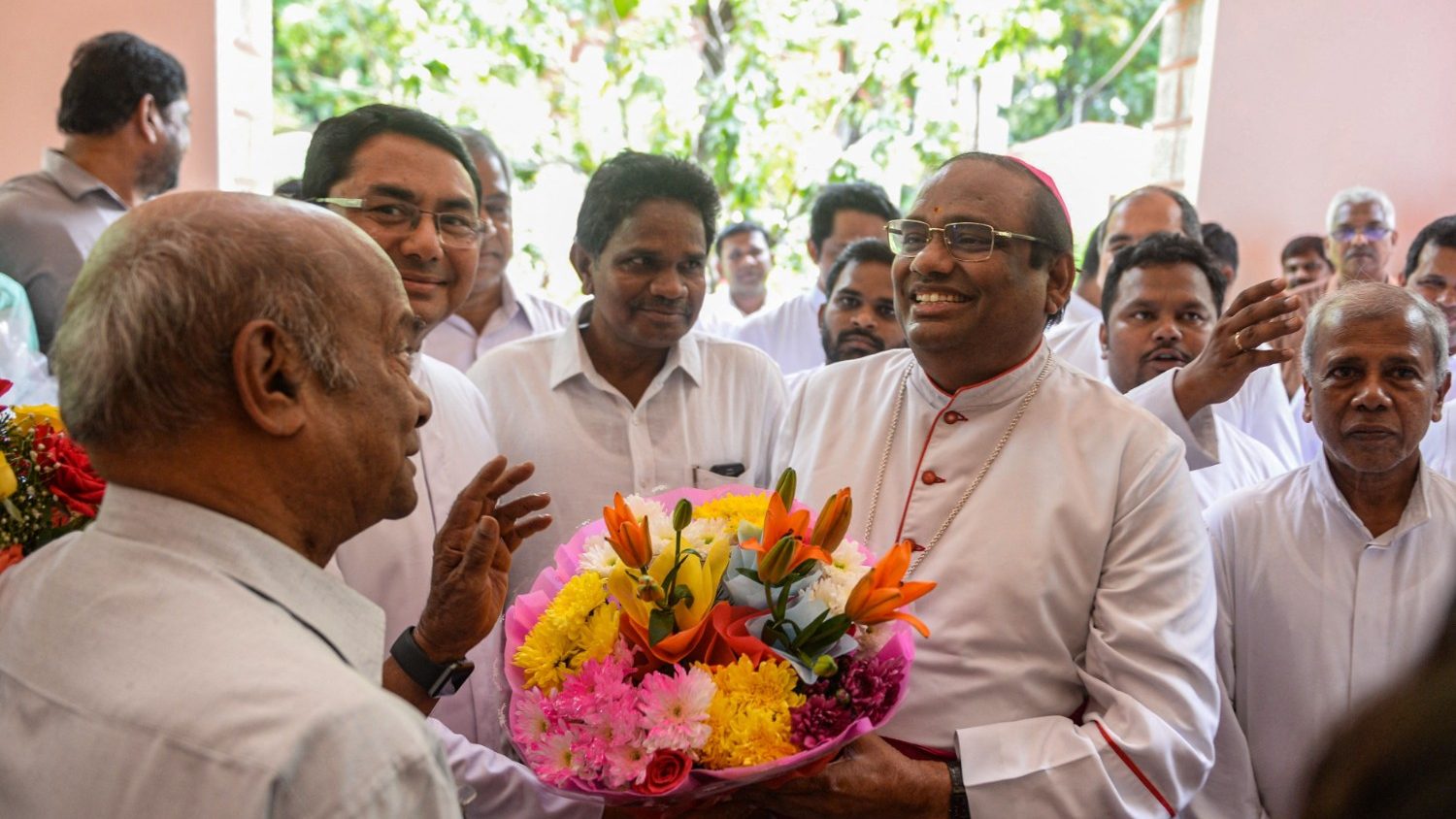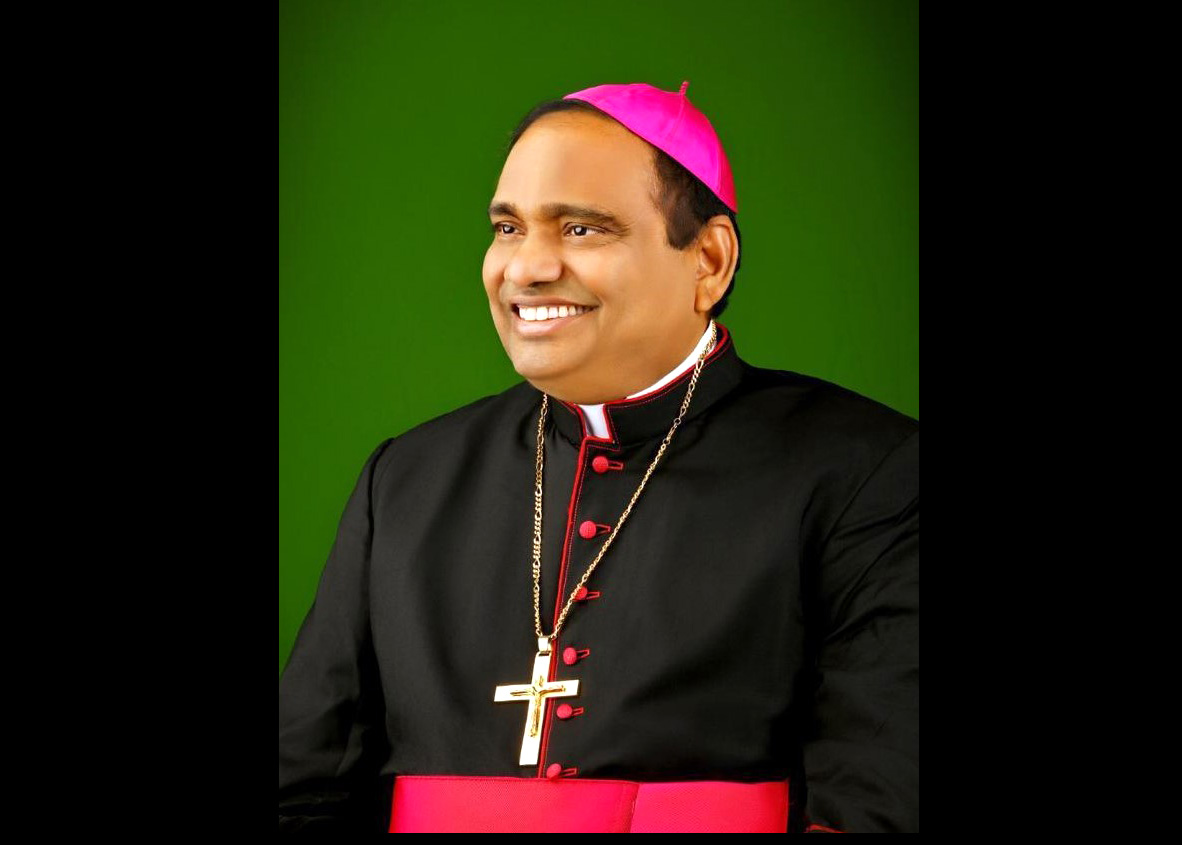ROME – Cardinal-elect Anthony Poola of Hyderabad, India’s first cardinal from the marginalized Dalit community, has said he wants to be a “missionary of compassion” for his people, especially young people and the poor.
Speaking to Crux during a sit-down interview in Rome, Poola said “Pope Francis, as soon as he took office when he was elected, he said, ‘how I wish for a poor church for the poor.’ He always tells us bishops and cardinals, priests and consecrated women, that we need to reach out to the peripheries.”
“He has been fulfilling the rights of women, rights of children, rights of youth, there are many different sectors. So, I think there should be a rise from the Dalit community … a rise for the depressed and misfortunate,” he said.
Poola, who said he never dreamed of being a cardinal or even a bishop, sees his appointment as “a grace of God,” and hopes the honor will help him carry forward pastoral projects in his diocese for the poor and uneducated.
“Our land is very fertile for pastoral, social, educational apostolate,” he said, voicing hope that this can now be done “in a bigger way, especially with the mandate of Jesus for kindness, compassion, forgiveness, love, and of course with the spirit of Pope Francis, reaching out to the peripheries, and being the missionaries of compassion, the Good Samaritans.”
“The pope always says, the world already has so many intellectual people, today what we need are Good Samaritans, missionaries of compassion, so that is what I would like to do, and I will do my level best,” he said.
Poola, 60, was ordained a priest in 1992 and was appointed bishop of Kurnool in 2008. He was then named archbishop of Hyderabad in 2020 and was appointed a cardinal by Pope Francis in May.
Notably, he is the very first cardinal from India’s Dalit community – formerly known as the “untouchables” within the Hindu caste system, which continues to face discrimination and exclusion.
Dalits make up around 25 percent of the total population in India. However, they are roughly 50-75 percent of all Christians in India, and between 60-75 percent of Catholics. Many Dalit Christians have complained that they are notoriously absent from ecclesial hierarchy, despite their numbers.
As of 2000, just six of the 156 Catholic bishops in India were Dalits, and out of 12,500 Catholic priests, only about 600 were Dalits.
Poola’s appointment as the first Dalit cardinal, then, is seen by observers as not only an honor for India, but as a much-needed blow to widespread discrimination and as an empowerment of society’s most marginalized.
In addition to the significance of his appointment, Poola also spoke about his pastoral priorities, problems with clericalism and Hindu nationalism, and his impressions of Pope Francis’s recent reforms.
Please read below for excerpts of Crux’s conversation with Cardinal-designate Anthony Poola:
Crux: Did you have any idea at all that you would be named a cardinal, or was it a surprise?
Poola: It was a complete surprise. I never dreamt of becoming a cardinal. I was traveling to Kerala for a Catholic Charismatic Renewal valedictory function. At the Angelus, the pope read out our names, and I heard from a couple of friends in Italy, who told me, ‘Congratulations, you are appointed as cardinal.’ Then I thought, because I don’t know perfect Italian, they don’t know good English, so maybe they are confused about my appointment as archbishop of Hyderabad, so I told them I am only archbishop of Hyderabad, not cardinal. And they said no, we have heard it from the Angelus; Pope Francis read out your name and the diocese, and they sent out the link. Then I got a call from the nunciature telling me congratulations. So, it was a complete surprise, I really couldn’t believe it.
It was a moment of shock, and then slowly I realized. What a surprise. Then I really thought it’s a grace of God, and it’s a call that came through Pope Francis. I understand the love of Pope Francis to south India, and the first Telugu cardinal, and the first Dalit to be elevated as cardinal.
What does that mean to you?
Personally, what I understand of Pope Francis, as soon as he took office when he was elected, he said, ‘How I wish for a poor church for the poor,’ number one. Number two, he always tells us bishops and cardinals, priests, and consecrated women, that we need to reach out to the peripheries. He has been fulfilling the rights of women, rights of children, rights of youth – there are many different sectors. So, I think there should be a rise from the Dalit community. That’s how I look at it, a rise for the depressed and misfortunate.
I have no idea about being a cardinal. I never dreamt that one day I would be on the team of Pope Francis, I was a simple missionary guy, all my life as a priest for sixteen and a half years, and when my appointment came as a bishop in my native diocese, I thought that was a grace of God, but nothing of my greatness. And then came again another surprise, so choosing me to be the archbishop of Hyderabad, a metropolitan cosmos, a big city, and it is only some sixteen months now. Our land is very fertile for pastoral, social, educational apostolate.
I hope that we will be doing it in a bigger way, especially with the mandate of Jesus for kindness, compassion, forgiveness, love, and, of course, with the spirit of Pope Francis, reaching out to the peripheries, and being the missionaries of compassion, the Good Samaritans. The pope always says, the world already has so many intellectual people, today what we need are Good Samaritans, missionaries of compassion, so that is what I would like to do, and I will do my level best.
You mentioned that you are the first cardinal from the Dalit community. The majority of Christians and Catholics in India are Dalits, so what does your appointment mean for the Dalit community?
All of the Dalit community in south India and throughout the region, they are celebrating, celebrating that it is picked up so much in the media. That makes my responsibility a little heavier, listening to the people, but that doesn’t mean I ignore the others, because we are a universal church. A cardinal belongs not only to south India, but to the universal church, but making sure that justice is being done to all sections of the people, and with special reference to Dalits.
Do you think your appointment will open the door to other Dalits being named to positions of authority and leadership?
I think that’s how the pope is looking at it. I am speaking in terms of equality and unity, there should be proper representation from all different sectors. That’s how the church is thinking about it, in mind and spirit. So, I think so.
Equality and the inclusion of all voices are things the pope speaks about a lot, especially in terms of synodality. What does a synodal church look like to you, and how does this equality play a role within the Indian context?
If you just read about Vatican II, the church is not exclusive, it is an inclusive church, including all sectors of people. This synodality from Pope Francis for the past couple of years makes me understand that there is so much clericalism. That is the reason why I think it is the theme: communion, participation and mission. It is everybody’s responsibility, all of us walking together, all of us working together. I think this synod on synodality will help us with the vibration among the youth ministry, and also creating parish councils. Also, the participation of every child and married couple, the elderly, etc. That is what I look for in the Indian context.
You mentioned that clericalism is a problem. How do you see the problem of clericalism in the Indian context, and what do you think is the remedy?
When I was a child, missionaries came to our diocese, and they used to take the opinion of different people, making them sit so everybody can share, making everyone part of the celebration, part of the pastoral activities. That’s what I saw. But later, maybe we missed the point, and it has become more like dictators. So, the priest decides everything, and maybe he will take some like-minded people who will go according to his mind and not say anything. It has become more. In the Catholic bishops’ conferences, many times this topic came up, that clericalism should be reduced to a greater extent so that the people are involved in decision-making, in the administration of parishes, the administration of shrines, administration of the diocese, too.
It is not too late. I think we have begun some efforts, and it is taking shape. I hope that we will be able to eradicate clericalism. Strong efforts will have to be made, and our conferences are ready, and we are motivated; we are on the job!
How are relations between the Catholic Church and the government in India? There have been some concerns about potential links to Hindu nationalism. Is this a problem that you think needs to be addressed?
India is a beautiful country, and we have freedom of religion. They respect us there, except in a few places where some disgruntled fanatics are. We cannot take it out from everywhere, but the Indian government, the politicians, people who hold different responsibilities, they appreciate our educational services, they appreciate our social work, they appreciate our medical apostolate. So, our good work is always appreciated, and they have regard for our institutions, our hospitals, our social centers. For that I can vouch, and I can say they appreciate it.
In general, we have a good relationship with the government, whether it is congress, whether it is regional, we have a good rapport with the politicians. But some areas in the north, we have some troubles and difficulties. Tensions are there, but we have to discuss and dialogue with the government, showing them our good works.
How does the church navigate Hindu radicalism in those areas where it is a problem?
Sometimes there is vandalism, the destroying of the tabernacle, sometimes some holy statues [are destroyed], etc. When these things happen, we go to the government, and they make a survey and they arrest the people and say that these things are not tolerated.
In terms of your own diocese, what are your top priorities at the moment?
My father was a catechist. I am from a remote village, so it was missionaries who showed interest in my education, and after I finished my graduation, since I benefitted from the free education of the missionaries, I expressed my view to one of the missionaries and said, ‘This is what happened in my life, and I would like to become a priest so that I can help other students.’ That was my motto.
For me the topmost priority would be education apostolate, especially helping the poor with schooling. No child, Catholics, should be deprived of education because of their poverty. In the same way, some orphans are physically challenged, so my top priorities will be educational apostolate. Pastoral animation is very important. Our social work too, especially for immediate relief for things like clothing, food, education, things like that.
Regarding the events of the next few days, the Mass, the meeting of cardinals next week, do you have any goals or hopes for the outcome of these events?
I am happy going about the responsibility that is given to us. From what I understand, our responsibility will be enhanced. Where and how, we have to wait until after the consistory, and (studying) Predicate Evangelium.
What are your impressions of Pope Francis and the reforms he’s trying put forward?
The reforms he’s putting forward are very courageous, and a prophetical approach, that’s one thing I can say. Secondly, his love to the poor, the compassion to the marginalized, compassion to women and compassion to children, I have no words to explain. He is a living saint, and he will be a perfect model to me after Jesus.
I see that he is the pope of the times. I visited the USA after his election, and people talked about him. I visited Germany, and I visited here also. He’s a great leader. He’s a Jesuit, and a follower of the Ignatian spirituality, and the name that he took of Francis of Assisi, it speaks volumes to me. I will never miss reading all his articles. Sometimes if I have time, I will read the reflections he gives every day, they are beautiful. Very easy to understand.
Source: CRUX








